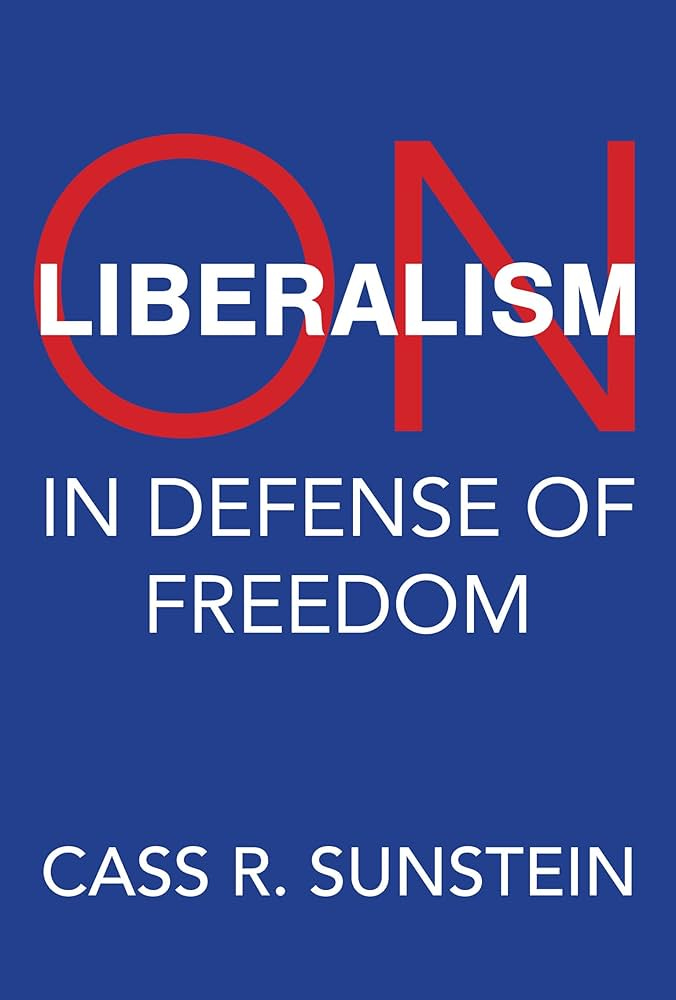On Liberalism, Cass Sunstein
A great new primer for liberal ideas
I had no need to read this book, but once I started I didn’t want to stop. Many of you will remember Sunstein’s editorial in the New York Times ‘Why I am a Liberal’, which is the starting point (much expanded) for his new book On Liberalism, which is both a primer and an apology. Sunstein’s own intellectual history is more on the progressive side of liberalism, rather than the classical side—the freedom-to, rather than the freedom-from, of Berlin’s great essay. He is more ecumenical now, and the chapter comparing the liberalism of Mill and Hayek (in which he rightly calls many of Hayek’s views on Mill “bunk”) is one of the better short pieces about Mill that I know.
I think Sunstein slightly mischaracterizes what he calls “pernicious individualism”—the libertarian ideas of the early twentieth century—and that he is wrong that they were not part of the Founding of the USA.
More importantly, he is right to point to the weak and insipid nature of too many defenses of modern liberalism. This book is now the definitive introduction to one of the world’s most important ideas (and it covers legal judgements which are too often skirted past).
Most of all, this book is valuable because Sunstein will not try and convert you to or away from a specific doctrine, like laissez faire. He is a brisk, thorough, well-informed guide through the way liberals do and do not think about such ideas. He is fair to all sides: a very excellent demonstration of liberal thinking! Mill would be proud!
If we could put liberalism into a word it would be individualism. Not the bogeyman of “atomistic” individualism: that is an idea that newspaper philosophers have used to mischaracterize their opponents. But the strong belief that everyone matters, and that a society is, fundamentally a collection of cooperating individuals, and that we should give as many of them as possible as much freedom as possible so that they may pursue happiness. This sort of liberal individualism is what V.S. Naipaul called the “awakened spirit”, and it has a strong tradition through Smith, Mill, and Hayek. It is the core of much that is great about our civilization, as Naipaul said.
This idea of the pursuit of happiness is at the heart of the attractiveness of the civilization to so many outside it or on its periphery. I find it marvelous to contemplate to what an extent, after two centuries, and after the terrible history of the earlier part of this century, the idea has come to a kind of fruition. It is an elastic idea; it fits all men. It implies a certain kind of society, a certain kind of awakened spirit. I don’t imagine my father’s Hindu parents would have been able to understand the idea. So much is contained in it: the idea of the individual, responsibility, choice, the life of the intellect, the idea of vocation and perfectibility and achievement. It is an immense human idea. It cannot be reduced to a fixed system. It cannot generate fanaticism. But it is known to exist, and because of that, other more rigid systems in the end blow away.
As Sunstein says, liberalism is full of hope: people are remaking it every day. His book is the latest contribution to the great tradition.



Good question. Fair question. I can't point to any one thinker or writer of any stature, though I hasten to add that I'm just, you know, a common reader. That said, I wouldn't be surprised if there ain't none, given the comparative disincentives of multidisciplinary work and the fact that prudence counsels considerable circumspection when invoking either biology or Machiavelli to advance a bold thesis of a social or political character. One substack author I have found very stimulating, though not always convincing or satisfying, is Michael McConkey, for example in his book A Plea for Time in the Phenotype Wars.
I wonder at the usefulness of such a wide term. If there is a through-line from Mill’s liberalism to laissez-faire then perhaps it is non-interference, but when one is focused on an individual's liberty and the other on freedom of markets, then I'm faced with a categorical conundrum. I would like to call myself a liberal, but while one version I could cry heartily from the rooftops, the other kind of makes my skin crawl.